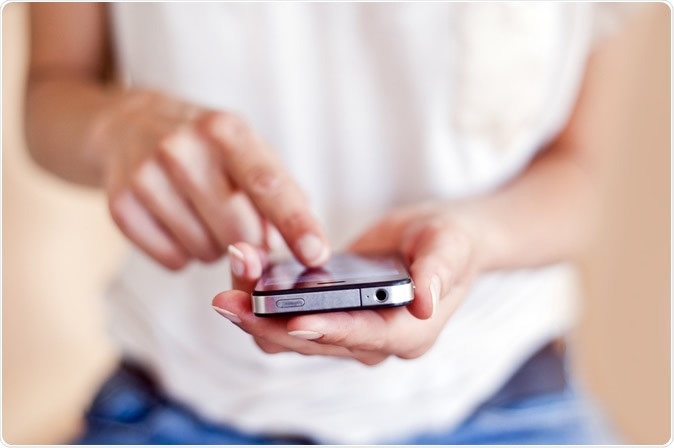A new study has warned that Smartphone apps that promise to detect skin cancers from moles or marks over the skin could be missing out on potential cancers. These apps say the researchers, could be missing out melanomas and could be declaring potentially dangerous lesions as safe. The results of the study titled, "Algorithm based smartphone apps to assess risk of skin cancer in adults: systematic review of diagnostic accuracy studies," were published this week in The BMJ.

Image Credit: pcruciatti / Shutterstock
Every year there are two to three million and 132,000 new cases of non-melanoma and melanoma skin cancers respectively around the world. These statistics come from the World Health Organization, which says that exposure to harmful ultraviolet rays of the sun and exposure to sunbeds could be one of the most influential risk factors for skin cancers. Early diagnosis often helps in the spread of cancer and results in high rates of cure, say experts. In countries such as Australia, skin cancers kill more men than women say the experts at WHO, and there has been an exponential rise in the number of cases detected in this country. Melanoma is 1.7 percent of the cancers and has a very high risk of mortality wrote the researchers.
A team of researchers from the universities of Birmingham and Nottingham in the United Kingdom looked at two popular skin cancer detection apps from the UK - SkinVision, and SkinScan for their efficacy in detecting skin cancers. These apps are widely used in the UK but are not yet approved for use in the United States by the Food and Drug Administration (FDA).
The authors of the study wrote, "Our review found poor and variable performance of algorithm-based Smartphone apps, which indicates that these apps have not yet shown sufficient promise to recommend their use." They warn the general public against relying entirely on these apps and speak about the risks "created by using Smartphone diagnostic or risk stratification apps." The team of researchers urges physicians and health care providers to be aware of the limitations of these apps that are based on algorithms and to spread awareness among the general public.
There have been previous studies, wrote the researchers. In these nine studies, six different Smartphone apps have been reviewed for their efficacy in detecting skin cancers from the moles. SkinVision and SkinScan are regulated under class 1 medical devices in the UK. This means that they carry a low to moderate risk to their users, explain the researchers. These apps use Artificial Intelligence or AI-based algorithms to detect skin cancers from skin lesions.
Professor Jon Deeks at the University of Birmingham and Professor Hywel Williams at the University of Nottingham and their teams looked at the nine studies. They looked at the photos that the apps, as well as researchers, analyzed for the presence or absence of cancers. The images that the apps could not assess were excluded, and the other participants were analyzed for this new study.
Results showed that SkinScan in a study looked at 15 moles, and of these five had melanomas. The app has missed all five of them. SkinVision similarly was assessed in two studies. In one of the studies, the app had looked at 108 moles and of these, there were 35 moles that were either frankly cancerous or in a stage before actual cancer. The app had a sensitivity of 88 percent. This meant that it missed detecting 12 percent of cancerous or precancerous moles or false negatives. The app had a specificity of 79 percent, meaning 21 percent of the moles that were not cancerous would be flagged or false positives. The team analyzed the studies and wrote that if 1000 persons were screened using these apps, of which 3 percent or 30 had melanomas, SkinVision would miss 4 of the cases and tell 200 individuals falsely that their moles were cancerous or precancerous.
Lead researcher Dr. Jac Dinnes, of the Institute of Applied Health Research at the University of Birmingham, said, "This is a fast-moving field, and it's really disappointing that there is not better quality evidence available to judge the efficacy of these apps. It is vital that healthcare professionals are aware of the current limitations both in the technologies and in their evaluations." Hywel Williams, Professor of Dermatology at the University of Nottingham, one of the co-authors of the study, said that if there is a doubt, its best to get checked by a GP.
At present, these apps come under the purview of the UK Medicines and Healthcare Products Regulatory Agency (MHRA). Starting this year, they may be regulated by the new Medical Device Regulations. Co-author Jon Deeks, Professor of Biostatistics in the Institute of Applied Health Research, said, "Regulators need to become alert to the potential harm that is poorly performing algorithm-based diagnostic or risk monitoring apps create. We rely on the CE mark as a sign of quality, but the current CE mark assessment processes are not fit for protecting the public against the risks that these apps present."
In a linked editorial in the same issue by researchers from the University of Oxford agreed that stricter measures need to be taken to ensure the safety and efficacy of these apps.
Journal reference:
Algorithm based smartphone apps to assess risk of skin cancer in adults: systematic review of diagnostic accuracy studies BMJ 2020; 368 doi: https://doi.org/10.1136/bmj.m127 (Published 10 February 2020) BMJ 2020;368:m127